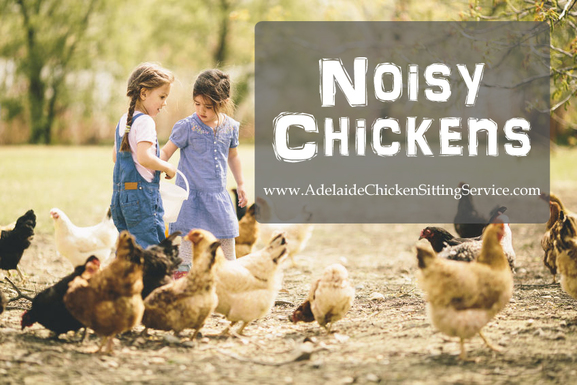We can easily be charmed by those sweet little chickens by their feathers alone without a thought for how noisy they might become.
So when the din begins there are some handy ideas to keeping the noise down.
Every council district throughout Australia will have animal policies, whether they are pets or livestock. Those of us living in the suburbs are keenly aware that we need to be very mindful of our neighbours and make sure that we are obeying the sound and smell rules on our properties.
Having just two or three chickens can be a breeze. Our neighbours will hardly notice that there are chickens over the other side of their fence. But once your chicken addiction starts to get out of hand, so can the noise.
Numbers
The amount of chickens will increase the noise. That might sound obvious, but there is more of a call from the girls in the morning when they beg to be let out of their coop if they free range throughout the day. Once out, the sound level will reduce until each girl goes into lay; that’s when they let everyone know that they just popped out a triumphant egg. The higher the number of hens, the stronger the smell can be, too.
On a farm with hundreds of chickens, there is an all-day noise from the chickens which a very different level to the town or suburban backyard. Listening to hens in a farm situation is like listening to the crowd of people at an entertainment event. They just have to talk. So it does go to show the more hens there are, the stronger and more constant the noise becomes.
Seasons
Spring is actually the noisiest month in our yard with the chickens. The days are longer and warmer, the girls are starting to lay double-yolker eggs, while a couple of the hens decide to go broody again. So if you are purchasing chickens at other times throughout the year, you may be fooled into thinking that the breed you have chosen is relatively quiet.
Light
Spring and summer have an abundance of light that stream into the chicken coop, so minimising the light can help to keep the girls a bit quieter in the early hours of the morning. The trick is to still allow in a good airflow while reducing the brightness. Skylights are great for winter laying, but in the warmer months allow extra light and heat in. Try a temporary metal sheet or hessian sacks held down with a couple of bricks can reduce the extra light.
Growing vines such as grapes over the coop can also assist. In winter, their deciduous nature means that more light is able to penetrate the coop again. The leaves on the vines not only help to reduce light but still allow the airflow.
Make good use of fig trees in your garden for the coop position as they are great as a summer covering too, and allow in the winter light during their dormant season.
Breeds
Your planned choice of breed can make all the difference. This means diligent research and compromise if noise reduction is very important to you. Bantams tend to be a lot quieter than larger sized hens. The good old ISA Brown hens can have variable temperaments but are overall a reasonable breed when it comes to less noise.
As lovely as Orpingtons, Sussex and Wyandottes look they can go on with their noisy outbursts for quite some time especially if they have just laid an egg or want a hen to get out of their favourite nesting box. Orpingtons can be very chatty as they follow you around the garden, putting in their latest complaint or chat about the weather. My Orpingtons are at their loudest in spring but are much quieter throughout the rest of the year. All breeds will vary.
Choose a docile breed for a quieter chickens, such as the Araucana, Andalusian, Brahma, Cochin, Faverolle, Frizzle, Hamburg, New Hampshire, Rhode Island Red, Silkie and Polish.
Please note that individual personalities of chickens can mean an unexpected noisier chicken.
Roosters
Many town and suburban councils Australia-wide do not permit roosters. Check with your local council before acquiring a boy for your backyard. Your neighbours have the right to complain to council by submitting a crow diary just like a bark diary for a noisy dog.
Keeping roosters for breeding and showing purposes is a common practice. However, roosters are easily set off at all times night and day by sound and light and their own crazy personalities. So reducing their access to light is the first priority to keeping their noise down.
Some rooster owners build their own Rooster Boxes to lock the boys away in every night, but please be aware that during the Australian summer months they may not have adequate cooling airflow in there. Those who have good success with the Rooster Box also keep the box in a very cool part of the house, usually in a cellar.
Rooster No Crow or Cock Collars is another way to reduce their crowing without stopping them completely. The collar around their necks reduces the amount of air that they can take in to let out a crowing noise. It will not prevent crowing from occurring, just the level of noise. Many people have mixed results due to the boys’ personality and breed.
Another method is to keep the boys in a small smaller squat cage so that they are unable to stretch to take in a deep breath to let out their crow. I would not recommend this as a permanent arrangement but it will help keep the boys from crowing throughout the night and early morning hours. Allow them out of this type of caging during the daylight hours for normal foraging activity.
Enclosure
If the chickens are used to free-ranging but are suddenly locked in, this can cause them more distress and thus the noise will become quite loud in protest. You may just want to mow the lawn or they need to be housed in quarantine due to health for a few weeks.
People who often purchase older hens and introduce them to a new backyard with a different coop and yard set up from the one that they are use to are most likely to have noise issues. Try to minimise their transition and attempt to give them as much roaming room as practically possible to help keep the hens calm. Providing boredom busters can help keep their mind off of their lack of room.
Intruder
The more time you spend with your flock the more you get to know all of their special calls. There’s general chatty time, ‘I need to lay’, followed by ‘I just laid an egg’, and the popular ‘Where’s my afternoon snack?’ call.
But there are other more alarming chicken calls that alert not only the other hens but us too, such as when there is a predatory bird flying overhead, a fox, snake or the local cat peeking over the fence.
The sight of a mouse can send the girls into a panic or flurry of excited activity and talk. Some hens love to hunt mice while others will be too scared to go near their food source while the rodent is in the area. This can stir the hens’ activity and noise level. If you need to cull the rodent activity, traps are safer to use than bait around the chicken coop. This in case a hen does catch a mouse to eat, we don’t want the hen to also ingest the bait unwittingly.
If your flock have become scared to go into their nesting boxes, there may be a predator in there taking advantage of the coziness and access to eggs as a food source, such as a snake or monitor lizard.
Take notice of their special warning calls and take up the opportunity to investigate during their calls for their safety and to return the calm. Hunt down what stirs them up.
Maybe you have a good technique for keeping your chickens quiet. We would love to hear from you.




 RSS Feed
RSS Feed